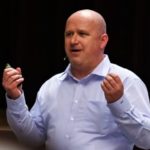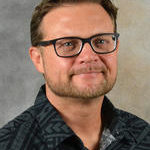For our 27th annual event, TCC features plenary sessions twice each day at 9 AM and 2 PM HST. These sessions are scheduled so that participants may view a live session during a a typically workday in four regions around the world: Asia (Tokyo), Hawaii (HST), North America (EDT) and Europe (EEST). Regardless of your location, there will be a plenary session that you can join in real-time.
3D Virtual Worlds for Prime-Time Online Learning: Accessibility, Browser-Based & Spatial Audio Considerations
Tuesday, Apr 12, 2022 / 10:00 AM HST
Tuesday, Apr 12, 2022 / 10:00 AM HST
Date/Time: Tuesday, Apr 12, 2022 / 10:00 AM HST
Description: While three-dimensional virtual worlds (3D VWs) have provided exciting opportunities for instructors and learners, what barriers still exist to the widespread adoption of virtual world use in the classroom? This presentation discusses the unique challenges for accessibility in 3D VWs specifically with audio descriptions and supporting blind and visually impaired users construct a mental model of the 3D virtual space. Additionally, recent developments in 3D virtual spaces have made it easier for both faculty and students to be together virtually. This presentation will cover advancements in browser-based 3D VWs as well as spatial audio virtual spaces as alternatives to video conferencing.
About Your Presenter: Dr. Peter Leong
Associate Professor, Department of Learning Design & Technology
University of Hawaii-Manoa
Dr. Peter Leong is an award-winning Associate Professor with the Department of Learning Design & Technology, University of Hawaii-Manoa. He has extensive experience in the development and delivery of online courses and distance education.
Dr. Peter Leong
Associate Professor, Department of Learning Design & Technology
University of Hawaii-Manoa
Dr. Peter Leong is an award-winning Associate Professor with the Department of Learning Design & Technology, University of Hawaii-Manoa. He has extensive experience in the development and delivery of online courses and distance education.
Description: While three-dimensional virtual worlds (3D VWs) have provided exciting opportunities for instructors and learners, what barriers still exist to the widespread adoption of virtual world use in the classroom? This presentation discusses the unique challenges for accessibility in 3D VWs specifically with audio descriptions and supporting blind and visually impaired users construct a mental model of the 3D virtual space. Additionally, recent developments in 3D virtual spaces have made it easier for both faculty and students to be together virtually. This presentation will cover advancements in browser-based 3D VWs as well as spatial audio virtual spaces as alternatives to video conferencing.
About Your Presenter:
 Dr. Peter Leong
Associate Professor, Department of Learning Design & Technology
University of Hawaii-Manoa
Dr. Peter Leong is an award-winning Associate Professor with the Department of Learning Design & Technology, University of Hawaii-Manoa. He has extensive experience in the development and delivery of online courses and distance education.
Dr. Peter Leong
Associate Professor, Department of Learning Design & Technology
University of Hawaii-Manoa
Dr. Peter Leong is an award-winning Associate Professor with the Department of Learning Design & Technology, University of Hawaii-Manoa. He has extensive experience in the development and delivery of online courses and distance education.
Smart Skills & Digital Badges - Future-proofing Careers
Tuesday, Apr 12, 2022 / 2:00 PM HST
Tuesday, Apr 12, 2022 / 2:00 PM HST
Date/Time: Tuesday, Apr 12, 2022 / 2:00 PM HST
Description: Gamification, short courses, and digital badges have been used to prepare learners for the quickly changing world of work in a meaningful and engaging way. The project stemmed from research on skills that were most sought-after by industry and which employers identified as a gap in university graduates and employees.
About Your Presenter: Eoghan Hogan
Director of Product Innovation
Torrens Global Education Services, Australia and New Zealand
Eoghan Hogan is Director of Product Innovation at Torrens Global Education Services, Australia and New Zealand – which includes Torrens University Australia, Media Design School and Think Education. He leads a team of Project Managers, Virtual Reality developers, Learning Experience Designers, Online Learning Environment Designs and Digital Media Designers to ensure the design and development of course offerings are informed by best practices in adult, industry-immersive and hybrid, blended and online learning. Eoghan and his team have also been tasked with the delivery of all short course and micro-credential products and platforms at a time when online learning has become a paramount delivery option for institutions and consumers alike.
Eoghan Hogan
Director of Product Innovation
Torrens Global Education Services, Australia and New Zealand
Eoghan Hogan is Director of Product Innovation at Torrens Global Education Services, Australia and New Zealand – which includes Torrens University Australia, Media Design School and Think Education. He leads a team of Project Managers, Virtual Reality developers, Learning Experience Designers, Online Learning Environment Designs and Digital Media Designers to ensure the design and development of course offerings are informed by best practices in adult, industry-immersive and hybrid, blended and online learning. Eoghan and his team have also been tasked with the delivery of all short course and micro-credential products and platforms at a time when online learning has become a paramount delivery option for institutions and consumers alike.
Description: Gamification, short courses, and digital badges have been used to prepare learners for the quickly changing world of work in a meaningful and engaging way. The project stemmed from research on skills that were most sought-after by industry and which employers identified as a gap in university graduates and employees.
About Your Presenter:
 Eoghan Hogan
Director of Product Innovation
Torrens Global Education Services, Australia and New Zealand
Eoghan Hogan is Director of Product Innovation at Torrens Global Education Services, Australia and New Zealand – which includes Torrens University Australia, Media Design School and Think Education. He leads a team of Project Managers, Virtual Reality developers, Learning Experience Designers, Online Learning Environment Designs and Digital Media Designers to ensure the design and development of course offerings are informed by best practices in adult, industry-immersive and hybrid, blended and online learning. Eoghan and his team have also been tasked with the delivery of all short course and micro-credential products and platforms at a time when online learning has become a paramount delivery option for institutions and consumers alike.
Eoghan Hogan
Director of Product Innovation
Torrens Global Education Services, Australia and New Zealand
Eoghan Hogan is Director of Product Innovation at Torrens Global Education Services, Australia and New Zealand – which includes Torrens University Australia, Media Design School and Think Education. He leads a team of Project Managers, Virtual Reality developers, Learning Experience Designers, Online Learning Environment Designs and Digital Media Designers to ensure the design and development of course offerings are informed by best practices in adult, industry-immersive and hybrid, blended and online learning. Eoghan and his team have also been tasked with the delivery of all short course and micro-credential products and platforms at a time when online learning has become a paramount delivery option for institutions and consumers alike.
How Coronavirus Might Change Education Practices in Europe
Wednesday, Apr 13, 2022 / 8:00 AM HST
Wednesday, Apr 13, 2022 / 8:00 AM HST
Date/Time: Wednesday, Apr 13, 2022 / 8:00 AM HST
Description: Educational leaders from institutions in Europe will reflect upon the changes the pandemic has already brought to their organizations, discuss how they see education developing into the future, and the implications of the increasing use of digital technologies to mediate the education process and the impact of these changes on students, teachers, educational leaders, and on society as a whole.
About Your Presenters: Mark Curcher
Senior Lecturer
Tampere University of Applied Sciences in Finland
Mark Curcher, “pedagogical provocateur” and “educational émigré” is a Senior Lecturer at Tampere University of Applied Sciences in Finland. Additionally, he is the designer and director of the MBA program in Educational Leadership and a member of the non-affiliated Critical Applied Research of Digitalization in Education (CARDE) Research Group. He is known for using many wave metaphors.
Mark Curcher
Senior Lecturer
Tampere University of Applied Sciences in Finland
Mark Curcher, “pedagogical provocateur” and “educational émigré” is a Senior Lecturer at Tampere University of Applied Sciences in Finland. Additionally, he is the designer and director of the MBA program in Educational Leadership and a member of the non-affiliated Critical Applied Research of Digitalization in Education (CARDE) Research Group. He is known for using many wave metaphors.
 Kathy Charles
Executive Dean for Learning and Teaching
Nottingham Trent University
Dr. Kathy Charles is the Executive Dean for Learning and Teaching at Nottingham Trent University, UK, and an alumnus of the MBA in Educational Leadership from Tampere University of Applied Sciences. Her academic focus is creating and sustaining a culture of high-quality teaching, and promoting continuing professional development and the scholarship of learning and teaching.
Kathy Charles
Executive Dean for Learning and Teaching
Nottingham Trent University
Dr. Kathy Charles is the Executive Dean for Learning and Teaching at Nottingham Trent University, UK, and an alumnus of the MBA in Educational Leadership from Tampere University of Applied Sciences. Her academic focus is creating and sustaining a culture of high-quality teaching, and promoting continuing professional development and the scholarship of learning and teaching.
 Mauro Spicci, PhD
Co-Director
Mauro Spicci, PhD, co-directs a bilingual school in Milan, Italy using an innovative approach to promote critical thinking skills through a transdisciplinary curriculum. His research interests include the analysis of the impact social reading practices have on education, the promotion of new “hybrid” reading practices across schools, the power of “online communities” in co-defining training courses for schools, and the effective promotion of equity in both the digital and the real world of education.
Mauro Spicci, PhD
Co-Director
Mauro Spicci, PhD, co-directs a bilingual school in Milan, Italy using an innovative approach to promote critical thinking skills through a transdisciplinary curriculum. His research interests include the analysis of the impact social reading practices have on education, the promotion of new “hybrid” reading practices across schools, the power of “online communities” in co-defining training courses for schools, and the effective promotion of equity in both the digital and the real world of education.
Description: Educational leaders from institutions in Europe will reflect upon the changes the pandemic has already brought to their organizations, discuss how they see education developing into the future, and the implications of the increasing use of digital technologies to mediate the education process and the impact of these changes on students, teachers, educational leaders, and on society as a whole.
About Your Presenters:
 Mark Curcher
Senior Lecturer
Tampere University of Applied Sciences in Finland
Mark Curcher, “pedagogical provocateur” and “educational émigré” is a Senior Lecturer at Tampere University of Applied Sciences in Finland. Additionally, he is the designer and director of the MBA program in Educational Leadership and a member of the non-affiliated Critical Applied Research of Digitalization in Education (CARDE) Research Group. He is known for using many wave metaphors.
Mark Curcher
Senior Lecturer
Tampere University of Applied Sciences in Finland
Mark Curcher, “pedagogical provocateur” and “educational émigré” is a Senior Lecturer at Tampere University of Applied Sciences in Finland. Additionally, he is the designer and director of the MBA program in Educational Leadership and a member of the non-affiliated Critical Applied Research of Digitalization in Education (CARDE) Research Group. He is known for using many wave metaphors.
 Kathy Charles
Executive Dean for Learning and Teaching
Nottingham Trent University
Dr. Kathy Charles is the Executive Dean for Learning and Teaching at Nottingham Trent University, UK, and an alumnus of the MBA in Educational Leadership from Tampere University of Applied Sciences. Her academic focus is creating and sustaining a culture of high-quality teaching, and promoting continuing professional development and the scholarship of learning and teaching.
Kathy Charles
Executive Dean for Learning and Teaching
Nottingham Trent University
Dr. Kathy Charles is the Executive Dean for Learning and Teaching at Nottingham Trent University, UK, and an alumnus of the MBA in Educational Leadership from Tampere University of Applied Sciences. Her academic focus is creating and sustaining a culture of high-quality teaching, and promoting continuing professional development and the scholarship of learning and teaching.
 Mauro Spicci, PhD
Co-Director
Mauro Spicci, PhD, co-directs a bilingual school in Milan, Italy using an innovative approach to promote critical thinking skills through a transdisciplinary curriculum. His research interests include the analysis of the impact social reading practices have on education, the promotion of new “hybrid” reading practices across schools, the power of “online communities” in co-defining training courses for schools, and the effective promotion of equity in both the digital and the real world of education.
Mauro Spicci, PhD
Co-Director
Mauro Spicci, PhD, co-directs a bilingual school in Milan, Italy using an innovative approach to promote critical thinking skills through a transdisciplinary curriculum. His research interests include the analysis of the impact social reading practices have on education, the promotion of new “hybrid” reading practices across schools, the power of “online communities” in co-defining training courses for schools, and the effective promotion of equity in both the digital and the real world of education.
Pacific Island Voices Symposium - The Hawaii Climate Data Portal (HCDP)
Wednesday, Apr 13, 2022 / 2:00 PM HST
Wednesday, Apr 13, 2022 / 2:00 PM HST
Date/Time: Wednesday, Apr 13, 2022 / 2:00 PM HST
Description: The Hawai‘i Climate Data Portal (HCDP) is an online platform that provides easy access to climate data and information for the State of Hawai‘i. Some of the portal features include; an electronic resource library, highlights of past and ongoing research, histories of rainfall mapping and monitoring efforts, and a tool that allows users to interact with historical and near-real-time data. Create and download rainfall and temperature maps, see how wet or dry it was last month, how cool or hot it was yesterday, or learn how rainfall and temperature are projected to change in the future. The HCDP allows unparalleled access to data and information that curriculum can easily be designed around. This presentation will focus on the current attributes of the HCDP and provide some examples of how students can interact with this resource.
About Your Presenter: Dr. Ryan Longman
Fellow, Research Program
East-West Center
Dr. Ryan J. Longman joined the East-West Center’s Research Program as a Fellow in November 2019 and has just recently joined the Pacific Islands Development Program team at the Center. Prior to working at the EWC, he completed his Ph.D. and M.A. degrees in Geography at the University of Hawai‘i at Mānoa. Since graduation, he has worked as a Lecturer within the University of Hawai‘i system, where he has taught classes on climate, water resources, and the natural environment. He has also worked as research scientist on a wide range of projects related to climate science including the development of the Hawai‘i Climate Data Portal (HCDP), an online repository for climate data and information for the State. Dr. Longman has experiences working in the field of Climate Finance and Project Preparation and has assisted in the development and delivery of a specialized project-preparation training course that has been delivered in 10-Pacific Island Nations. His focus now is to continue to support resilience building initiatives and adaptation needs in the Pacific.
Dr. Ryan Longman
Fellow, Research Program
East-West Center
Dr. Ryan J. Longman joined the East-West Center’s Research Program as a Fellow in November 2019 and has just recently joined the Pacific Islands Development Program team at the Center. Prior to working at the EWC, he completed his Ph.D. and M.A. degrees in Geography at the University of Hawai‘i at Mānoa. Since graduation, he has worked as a Lecturer within the University of Hawai‘i system, where he has taught classes on climate, water resources, and the natural environment. He has also worked as research scientist on a wide range of projects related to climate science including the development of the Hawai‘i Climate Data Portal (HCDP), an online repository for climate data and information for the State. Dr. Longman has experiences working in the field of Climate Finance and Project Preparation and has assisted in the development and delivery of a specialized project-preparation training course that has been delivered in 10-Pacific Island Nations. His focus now is to continue to support resilience building initiatives and adaptation needs in the Pacific.
Description: The Hawai‘i Climate Data Portal (HCDP) is an online platform that provides easy access to climate data and information for the State of Hawai‘i. Some of the portal features include; an electronic resource library, highlights of past and ongoing research, histories of rainfall mapping and monitoring efforts, and a tool that allows users to interact with historical and near-real-time data. Create and download rainfall and temperature maps, see how wet or dry it was last month, how cool or hot it was yesterday, or learn how rainfall and temperature are projected to change in the future. The HCDP allows unparalleled access to data and information that curriculum can easily be designed around. This presentation will focus on the current attributes of the HCDP and provide some examples of how students can interact with this resource.
About Your Presenter:
 Dr. Ryan Longman
Fellow, Research Program
East-West Center
Dr. Ryan J. Longman joined the East-West Center’s Research Program as a Fellow in November 2019 and has just recently joined the Pacific Islands Development Program team at the Center. Prior to working at the EWC, he completed his Ph.D. and M.A. degrees in Geography at the University of Hawai‘i at Mānoa. Since graduation, he has worked as a Lecturer within the University of Hawai‘i system, where he has taught classes on climate, water resources, and the natural environment. He has also worked as research scientist on a wide range of projects related to climate science including the development of the Hawai‘i Climate Data Portal (HCDP), an online repository for climate data and information for the State. Dr. Longman has experiences working in the field of Climate Finance and Project Preparation and has assisted in the development and delivery of a specialized project-preparation training course that has been delivered in 10-Pacific Island Nations. His focus now is to continue to support resilience building initiatives and adaptation needs in the Pacific.
Dr. Ryan Longman
Fellow, Research Program
East-West Center
Dr. Ryan J. Longman joined the East-West Center’s Research Program as a Fellow in November 2019 and has just recently joined the Pacific Islands Development Program team at the Center. Prior to working at the EWC, he completed his Ph.D. and M.A. degrees in Geography at the University of Hawai‘i at Mānoa. Since graduation, he has worked as a Lecturer within the University of Hawai‘i system, where he has taught classes on climate, water resources, and the natural environment. He has also worked as research scientist on a wide range of projects related to climate science including the development of the Hawai‘i Climate Data Portal (HCDP), an online repository for climate data and information for the State. Dr. Longman has experiences working in the field of Climate Finance and Project Preparation and has assisted in the development and delivery of a specialized project-preparation training course that has been delivered in 10-Pacific Island Nations. His focus now is to continue to support resilience building initiatives and adaptation needs in the Pacific.
VR 2022: Learning in the Metaverse
Thursday, Apr 14, 2022 / 10:00 AM HST
Thursday, Apr 14, 2022 / 10:00 AM HST
Date/Time: Thursday, Apr 14, 2022 / 10:00 AM HST
Description: Advances in virtual reality (VR) technology have expanded the use of VR from entertainment and social use into classroom applications. Join us as we reflect on the promise VR offers for learning, our wish list for teaching in the Metaverse, and what our early adopters need for instructional design in 3D environments.
About Your Presenter: Dr. Cynthia Calongne
Professor
Parker University
Dr. Cynthia Calongne is a professor at Parker University where she designs virtual reality (VR) learning simulations. She taught 55 higher education classes using virtual worlds for Colorado Technical University and Saint Martin's University. A pioneer in 3D immersive education, she received the Thinkerer award at the 2017 Virtual Worlds Best Practices in Education for lifetime achievement, and her team won the $25,000 Grand Prize in the Federal Virtual World Challenge for their space simulation, the Mars Expedition Strategy Challenge. She conducts research at Virtual Harmony in 3D game simulation and VR design.
Dr. Cynthia Calongne
Professor
Parker University
Dr. Cynthia Calongne is a professor at Parker University where she designs virtual reality (VR) learning simulations. She taught 55 higher education classes using virtual worlds for Colorado Technical University and Saint Martin's University. A pioneer in 3D immersive education, she received the Thinkerer award at the 2017 Virtual Worlds Best Practices in Education for lifetime achievement, and her team won the $25,000 Grand Prize in the Federal Virtual World Challenge for their space simulation, the Mars Expedition Strategy Challenge. She conducts research at Virtual Harmony in 3D game simulation and VR design.
Description: Advances in virtual reality (VR) technology have expanded the use of VR from entertainment and social use into classroom applications. Join us as we reflect on the promise VR offers for learning, our wish list for teaching in the Metaverse, and what our early adopters need for instructional design in 3D environments.
About Your Presenter:
 Dr. Cynthia Calongne
Professor
Parker University
Dr. Cynthia Calongne is a professor at Parker University where she designs virtual reality (VR) learning simulations. She taught 55 higher education classes using virtual worlds for Colorado Technical University and Saint Martin's University. A pioneer in 3D immersive education, she received the Thinkerer award at the 2017 Virtual Worlds Best Practices in Education for lifetime achievement, and her team won the $25,000 Grand Prize in the Federal Virtual World Challenge for their space simulation, the Mars Expedition Strategy Challenge. She conducts research at Virtual Harmony in 3D game simulation and VR design.
Dr. Cynthia Calongne
Professor
Parker University
Dr. Cynthia Calongne is a professor at Parker University where she designs virtual reality (VR) learning simulations. She taught 55 higher education classes using virtual worlds for Colorado Technical University and Saint Martin's University. A pioneer in 3D immersive education, she received the Thinkerer award at the 2017 Virtual Worlds Best Practices in Education for lifetime achievement, and her team won the $25,000 Grand Prize in the Federal Virtual World Challenge for their space simulation, the Mars Expedition Strategy Challenge. She conducts research at Virtual Harmony in 3D game simulation and VR design.
Post-COVID scenarios, stakes and opportunities for Teaching & Learning Practices and Learning Spaces: a French/Japanese comparative insight.
Thursday, Apr 14, 2022 / 2:00 PM HST
Thursday, Apr 14, 2022 / 2:00 PM HST
Date/Time: Thursday, Apr 14, 2022 / 2:00 PM HST
Description: The sustainability of all the measures that were implemented in Higher Education as a response to Coronavirus can be questioned. Hybrid models appear as a likely middle and long-term option, in which the physical Learning Spaces, after more than one year of non or under-use, could find an unprecedented position as key assets to support value added synchronous and asynchronous face-to-face activities. French and Japanese higher education systems present significantly different perspectives that will highlight cultural and structural specificities, as well as common stakes and opportunities.
About Your Presenter: John Augeri, Ph.D.
Practitioner and Researcher
Program Director
Ile-de-France Digital University (Paris)
Dr. John Augeri, Ph.D. is a practitioner and researcher, and Program Director at Ile-de-France Digital University (Paris). His core research activity consists of an international comparative study of innovative physical Learning Spaces he’s running since 2016, and that has led to him giving more than 70 talks in USA, Canada, Europe, Japan, Singapore, and Australia about the trends and the perspectives of these new learning environments.
John Augeri, Ph.D.
Practitioner and Researcher
Program Director
Ile-de-France Digital University (Paris)
Dr. John Augeri, Ph.D. is a practitioner and researcher, and Program Director at Ile-de-France Digital University (Paris). His core research activity consists of an international comparative study of innovative physical Learning Spaces he’s running since 2016, and that has led to him giving more than 70 talks in USA, Canada, Europe, Japan, Singapore, and Australia about the trends and the perspectives of these new learning environments.
Description: The sustainability of all the measures that were implemented in Higher Education as a response to Coronavirus can be questioned. Hybrid models appear as a likely middle and long-term option, in which the physical Learning Spaces, after more than one year of non or under-use, could find an unprecedented position as key assets to support value added synchronous and asynchronous face-to-face activities. French and Japanese higher education systems present significantly different perspectives that will highlight cultural and structural specificities, as well as common stakes and opportunities.
About Your Presenter:
 John Augeri, Ph.D.
Practitioner and Researcher
Program Director
Ile-de-France Digital University (Paris)
Dr. John Augeri, Ph.D. is a practitioner and researcher, and Program Director at Ile-de-France Digital University (Paris). His core research activity consists of an international comparative study of innovative physical Learning Spaces he’s running since 2016, and that has led to him giving more than 70 talks in USA, Canada, Europe, Japan, Singapore, and Australia about the trends and the perspectives of these new learning environments.
John Augeri, Ph.D.
Practitioner and Researcher
Program Director
Ile-de-France Digital University (Paris)
Dr. John Augeri, Ph.D. is a practitioner and researcher, and Program Director at Ile-de-France Digital University (Paris). His core research activity consists of an international comparative study of innovative physical Learning Spaces he’s running since 2016, and that has led to him giving more than 70 talks in USA, Canada, Europe, Japan, Singapore, and Australia about the trends and the perspectives of these new learning environments.
